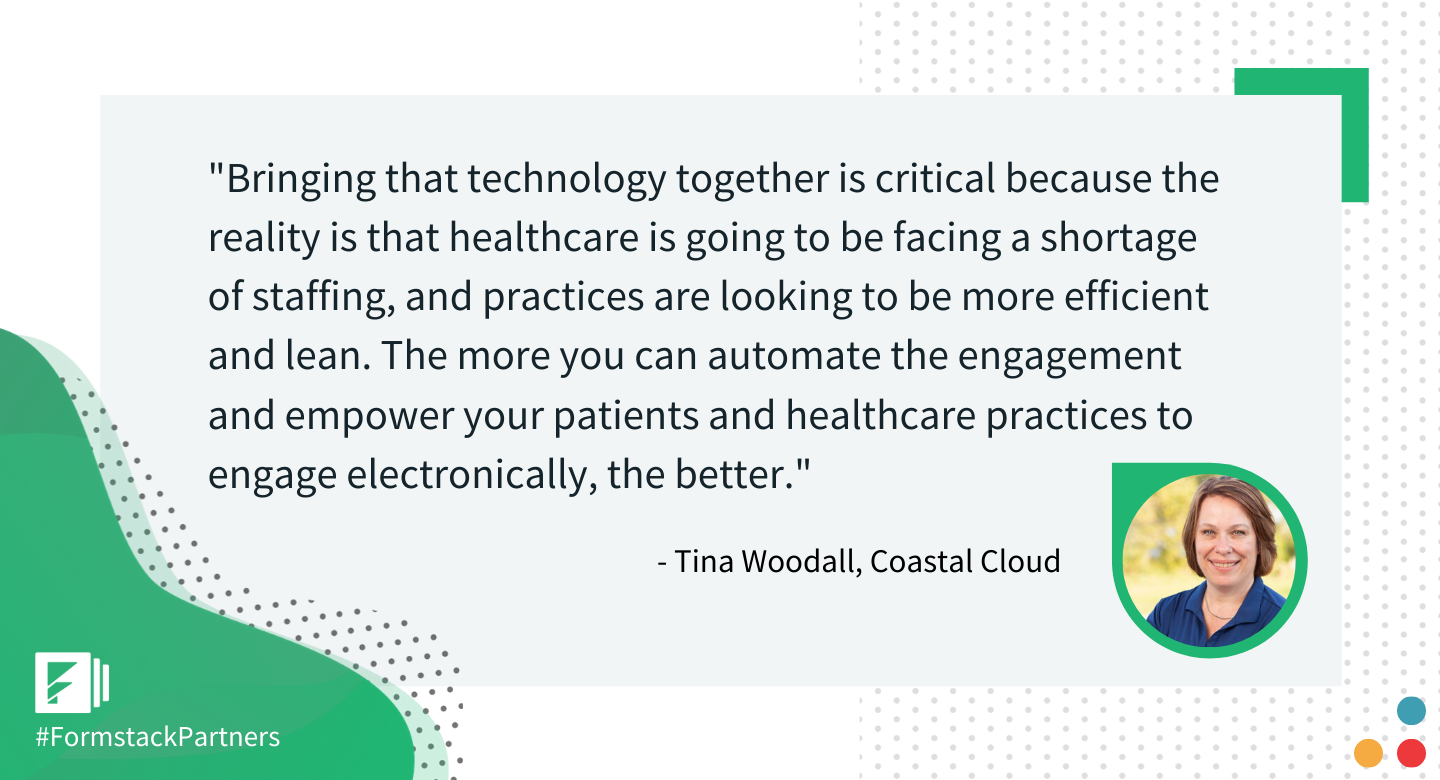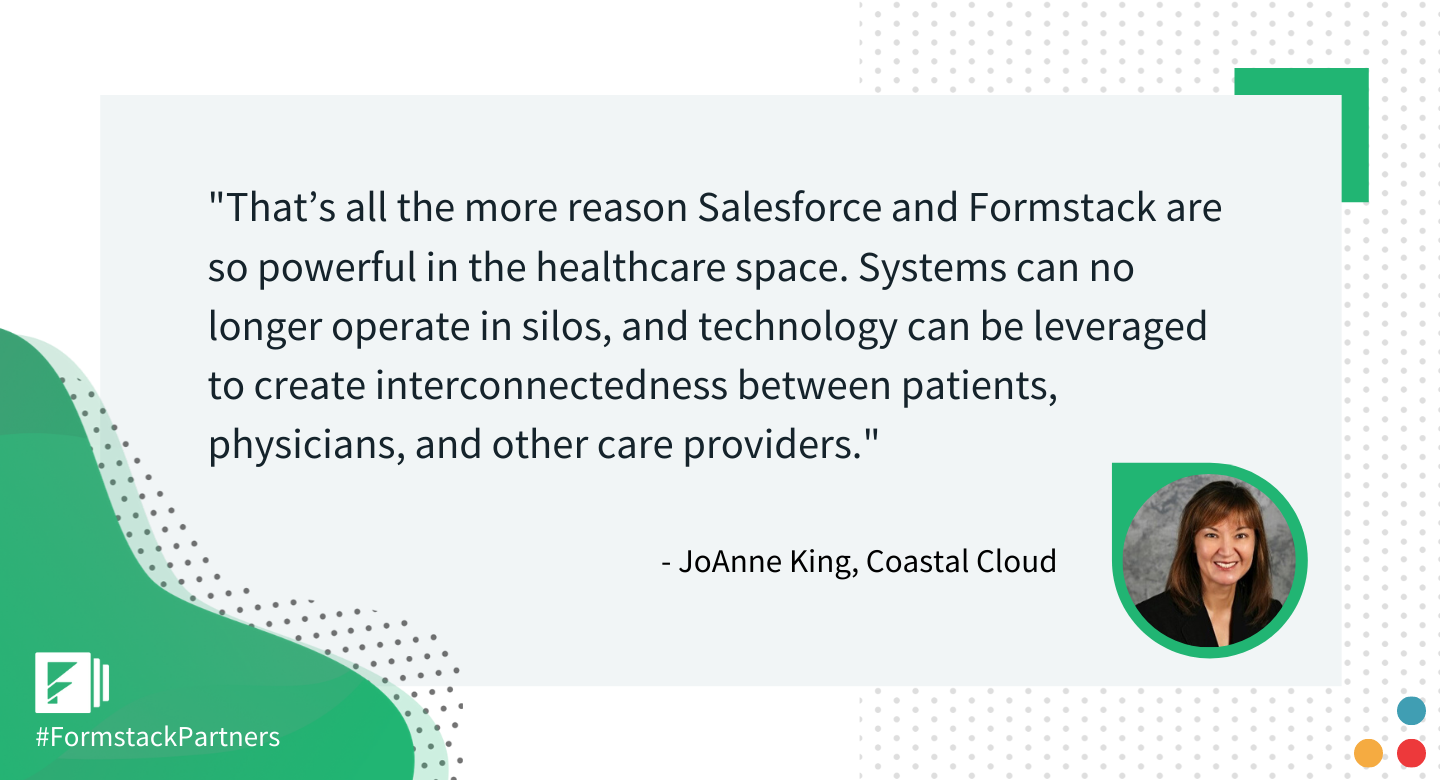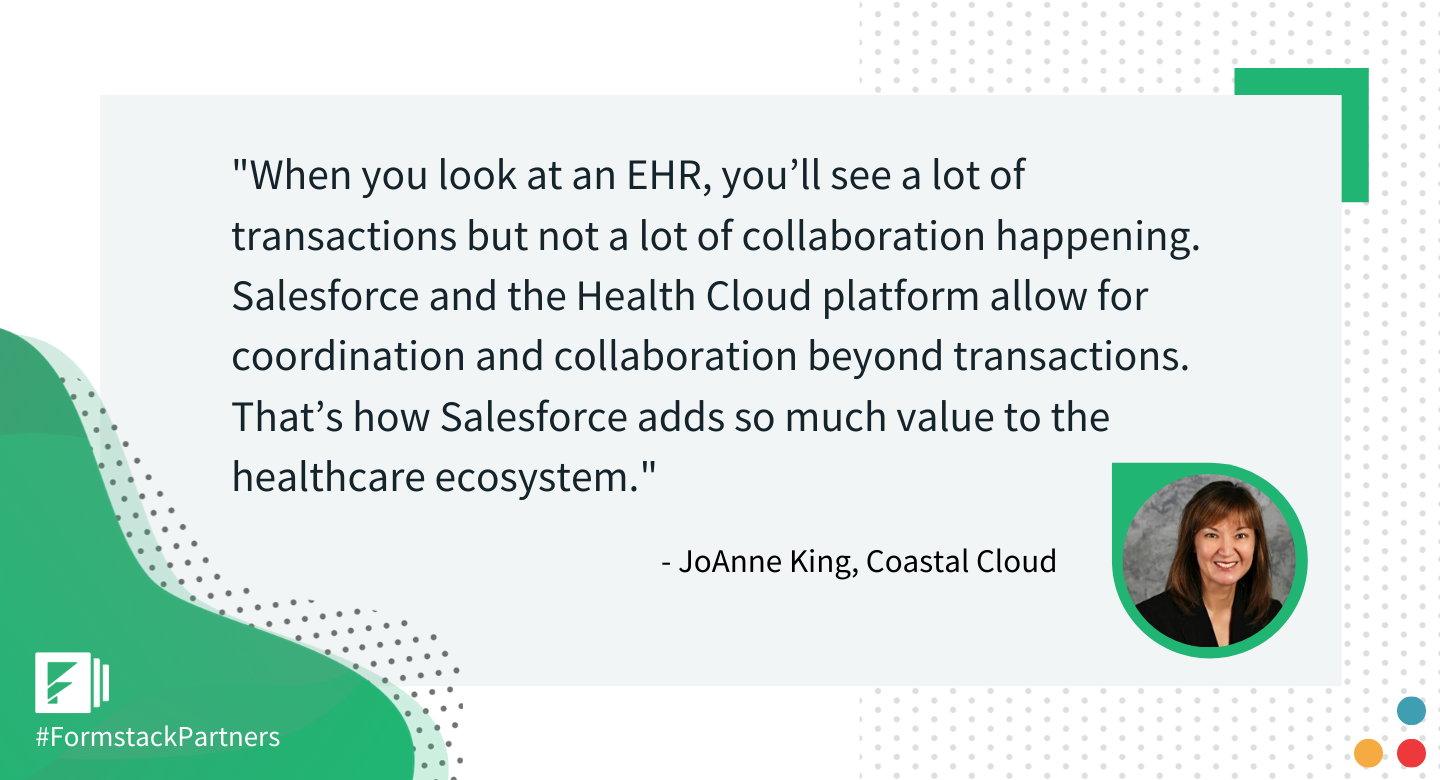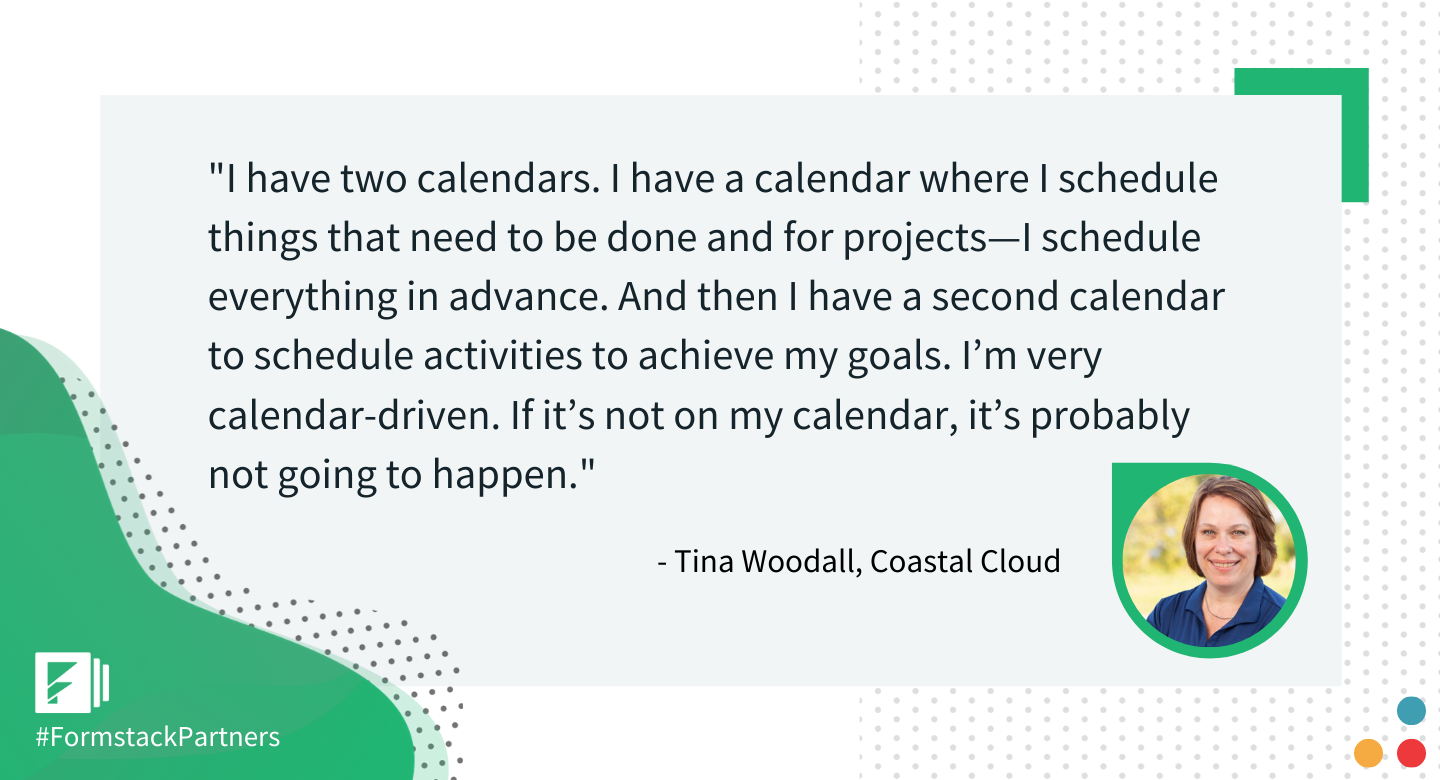Our VP of Partnerships Zak Pines recently sat down with two Coastal Cloud team members—JoAnne King, Healthcare Advisory Services Director, and Tina Woodall, Salesforce Senior Consultant—as part of our ongoing Partner Interview Series. Zak, JoAnne, and Tina had a far-ranging conversation that touched on improving patient experience and making it more personalized, the acceleration of the Salesforce Health Cloud, and Coastal Cloud’s growing healthcare practice. Here’s an abridged transcript of the chat.
Improving Patient Experience Through Technology
Zak: I am over the moon to be sitting here with two healthcare experts. There’s so much I want to ask you about Coastal Cloud and your backgrounds, and also your perspective on how you’re helping healthcare businesses apply technologies such as Salesforce and Formstack.
Let’s get some of the basic facts out there first, though. JoAnne, can you share a one-liner on Coastal Cloud and your healthcare practice?
JoAnne: Coastal Cloud is a woman-owned Salesforce Platinum Partner. We work across many industries, and this year, healthcare became our largest.
For our healthcare practice, our guiding principle is that there is one patient at the center of everything we do. We talk about improving businesses, but at the end of the day, it’s about the impact we have on real people—the patient, the family caregiver, the doctor, the nurse. That’s the gratifying piece.
Zak: Let’s go right to that—the patient experience. What are some of the opportunities for healthcare companies to leverage technology to improve physician satisfaction and relationships with their patients?
JoAnne: When we use technology well, whether it’s between patients and physicians or just patients interfacing with the system, it allows for more time for relationship building and communication. We’ve all been to our healthcare providers and had to fill out paperwork over and over again, and we probably ask ourselves why we need to fill out the same information over and over again. You can use the technology to help remove some of those barriers and frustrations patients face.
Tina: That’s right. If you already know me as a patient, then please communicate with me that way!
JoAnne: Yes. That’s been the approach in other industries, so the patient experience in healthcare should reflect that too, right?
We encourage our customers to set up processes that allow for information to be transferred and for the doctor to know who their patient is and what they are going through. The information is readily available, and a provider can access the information prior to the patient visit—that’s the ideal. Since doctors don’t have hours to spend with a patient, the more information they have available, the more efficient and productive the interaction can be.
Tina: From the patient experience, it’s not only about the first engagement.
Picture Sally who has to get surgery. She has some questions about her options and goes onto the physicians website to fill out an online form that has a HIPAA compliance component. From there, she comes in for the surgery and then has to come back for follow-up appointments or additional questions.
With the use of centralized technology systems, the dialogue can be managed, and you have a 360-view of the patient—what’s been done, what they’re asking, and what the patient may need as follow-up, such as a refill or progress reports. Setting up reminders to follow up with Sally seven to ten days later, asking how she’s doing and so forth, also helps promote positive patient outcomes.
Bringing that technology together is critical because the reality is that healthcare is going to be facing a shortage of staffing, and practices are looking to be more efficient and lean. The more you can automate the engagement and empower your patients and healthcare practices to engage electronically, the better.

Zak: It seems to me what you’re talking about here Tina is additive to everyone involved.
The patient wins because instead of being buried in repetitive paperwork, they are now getting ongoing guidance from the healthcare provider in a personalized fashion.
The healthcare providers end up saving time, as you say, in a resource-constrained world. We’ve also seen this in the nonprofit sector, where a more personalized, automated experience helps the resource-constrained nonprofits while also benefiting their members at the same time.
JoAnne, what is your reaction to what Tina is describing here? This personalization trend is only going to accelerate from here, right?
JoAnne: Absolutely. The future of healthcare is personalized medicine and the ability to coordinate outside the four walls of your business, whether it’s a hospital or doctor’s office.
If you have a patient who’s injured and on a rehabilitation plan, you’re going to need to make sure he’s taking his medication, going to therapy...all of those things he’s supposed to be doing. That’s where care collaboration and coordination come into play, since much of this is outside of your control and in the hands of the patient or other care providers.
That’s all the more reason Salesforce and Formstack are so powerful in the healthcare space. Systems can no longer operate in silos, and technology can be leveraged to create interconnectedness between patients, physicians, and other care providers.

Coastal Cloud + Salesforce + Formstack = Personalized Patient Experience
Zak: I don’t normally jump right into use cases, but let’s do that now because I want to keep building on this discussion on patient experience.
Tina, can you talk about how Formstack for Salesforce combines with Salesforce and how you use that to deliver more personalized patient experiences?
Tina: It’s about easily having public-facing forms that can link straight to a patient’s medical record. We use the Formstack native Salesforce forms product to build the intake forms, including the mobile component, which is essential. That extends the power of Salesforce in a method that’s HIPAA compliant.
It personalizes the experience for the patient. The minute they walk into the doctor’s office, they’re already known, and they aren’t asked the same question every time they walk through those doors. Your product provides a comfortable environment so that patients can answer questions and provide information when they want to, ahead of a visit.
This also impacts the doctors and physicians. They can be more relaxed because they know their patient, and the patient feels comfortable sharing more relevant details to help them. When a patient is in a relaxed atmosphere, they divulge a little bit more, and that improves the patient experience and hopefully gets them to a quicker diagnosis.
Zak: JoAnne, when you think of our combined value proposition for your customers, what are some other trends at play here?
JoAnne: From a high level, we’re looking at how health systems are becoming more verticalized. Providers are becoming payors, and payors are becoming providers, and providers are expanding their services beyond their traditional offerings. And they’re either doing it themselves or interfacing with others. There’s a greater need for collaboration and communication, and some of the regulations coming down the road are requiring more interoperability and connectedness.
When people think of technology, they don’t usually think of the healthcare system leading the way because we traditionally worked in silos due to privacy and HIPAA concerns. As we become a more verticalized and connected industry, we need to figure out how to protect health information and remain compliant. That’s where the partnership between Salesforce, Coastal Cloud, and Formstack meets those needs.
Tina: One of the things that keeps coming back to me when engaging with healthcare clients, and digital marketing specifically, is that we need to keep educating and empowering our healthcare partners to be protected and remain compliant. Even operations—they should be included too. You can’t assume they know the requirements to be HIPAA compliant.
Zak: That’s what I think is so interesting about the solutions you are providing to customers. There’s a compliant protection element—guarding against negative outcomes—and then there’s a relationship element—creating positive outcomes.
Tina: When we look at what problems we are typically helping our healthcare customers solve for, a lot of times they don’t realize that a web form that asks a consumer a question about interest in a medical procedure or event, that right there immediately becomes PHI and is covered by HIPAA. When that happens, it is critical this information meets a higher level of security. The fines for negligence for PHI breeches range from $100 per patient per day up to $50,000 per patient per day.
JoAnne: And there’s also the opportunity to be part of this interesting time we live in to support initiatives related to value-based purchasing and interoperability. Government payors, particularly Medicare, are challenging healthcare providers to communicate with each other. A hospital might be working with physicians or specialists who aren’t employees within their system—or with post-acute services such as a nursing home, home health, or hospice—and they need an efficient way to share information that’s compliant with the law.
Zak: We’re also seeing an opportunity to combine three types of processes—forms for data intake, data-driven document creation, and eSignature. Do you see all three of those as part of the solution?
JoAnne: Certainly. When I worked in healthcare administration, you often needed to secure signatures for contracts and legal reviews across a large system where people didn’t work in the same building or even the same state. The amount of faxing and scanning and chasing folks for signatures often caused delays. Now eSignature options have taken away much of that delay, and using these options has become a standard practice.
Zak: Let’s wrap up this topic by summarizing the impact smart, personalized progressive data capture has on the patient experience.
JoAnne: It’s all about improving the patient experience. I feel more confident when I walk into my providers and feel like they know me and I’m not just a number. They have my information, and I feel more valued. So I think there are opportunities to continue using technology to close that communication loop and engage patients and their families so that they are active participants in their care and have positive experiences with the health care system.
Being a patient is not easy. There’s usually something wrong when I’m interacting with the healthcare system, and that typically means I’m scared or nervous about whatever I’m facing. If technology can help me feel a bit less afraid, more understood, and that I’m being treated like a real person, all the better. Salesforce and Formstack together help us do that.
Salesforce Health Cloud Acceleration
Zak: Let’s zoom out to talk more about the Coastal healthcare practice. JoAnne, you mentioned earlier that it’s become Coastal Cloud’s fastest growing practice. What strikes me as you describe this is healthcare is such a vast ecosystem.
JoAnne: It is. When you talk to people and say healthcare, you might talk to 10 folks who all work in the industry, but you get 20 different answers. It’s such a broad ecosystem, and there are so many different capacities in which you can work.
There are many different sub-verticals within healthcare. Our clients include hospitals and health systems, as well as hospice and home care agencies and specialty clinics. We also work with payors and insurance companies, plus pharmaceuticals, including specialty pharmacies and life sciences companies.
Tina: When you’re looking at Salesforce, the brilliance is that it’s like Legos; you can assemble those Legos however you wish. Plus Salesforce has their Health Cloud product, which has many added-value components for the healthcare market.
Read Next: Partner Interview Series: John Receveur of Coastal Cloud
Where Coastal Cloud differentiates itself is that we have people like JoAnne and myself who have years of experience in the healthcare industry, and we’re taking technology and applying it to healthcare. I think what helps differentiate Coastal Cloud is that we intimately understand the needs of the healthcare organization and are applying a technical tool to the healthcare solution.
And right now there’s a lot of momentum building around Salesforce’s Health Cloud.
Zak: What’s driving that momentum?
Tina: When I was first introduced to Health Cloud at the start of 2019, it was mostly Service Cloud with a small amount of healthcare configurations. Now you see Salesforce rolling out very specific Health Cloud components, such as their Care Plan templates, Care Programs, and Social Determinants. They are focused on very healthcare-specific solutions, and they’ve focused their road map around it.
When we’re working with our clients, we let them know that they could spend twice the amount by having us custom build their solution, or they can go ahead and invest in Health Cloud, which is already built and ready to use. From there, we can work with them to modify and customize it for their use case, and they can take advantage of all the future offerings that are on Salesforce roadmap.
Zak: Something I’ve been curious about and wanted to ask you: When you’re having these conversations with your clients, do they consider Salesforce a CRM? Is CRM a term they use, or is there a different term specific to healthcare?
Tina: We don’t talk about CRM. We talk about how we can help support the patient population and how we can help their prospect become a patient under their care.
JoAnne: When I first joined the Coastal Cloud team, I hadn’t worked much with Salesforce, and my perception was that it’s a CRM and that’s it. I’ve learned that Salesforce is a very broad platform that can be used across a business and in the healthcare world to meet a variety of business needs.
Traditionally, the main use in healthcare for technology has been the electronic health record, the EHR. When you look at an EHR, you’ll see a lot of transactions but not a lot of collaboration happening. Salesforce and the Health Cloud platform allow for coordination and collaboration beyond transactions. That’s how Salesforce adds so much value to the healthcare ecosystem.

Tina: A good way to explain it is to look at it like this: EHRs are inside the hospital walls, and Salesforce is outside of the hospital walls. Salesforce and Formstack offer communication channels and intelligent information collection between patients, physicians, family members, etc.
JoAnne & Tina’s Healthcare Backgrounds
Zak: Let’s keep zooming out. I want to hear more about your backgrounds in healthcare. JoAnne, you are the Healthcare Advisory Services Director for Coastal Cloud. Why was that role such a great fit for you?
JoAnne: Coastal Cloud was looking for the healthcare industry perspective to complement their tremendous technical talent and expertise. They were looking for insight into executive challenges and how technology can support the future needs of healthcare.
Zak: What are some of the key aspects of the role?
JoAnne: I work with clients and prospects, engage in executive conversations, and help them with strategic visioning. I reinforce Coastal Cloud’s healthcare point of view around the one patient experience.
Zak: How did you get started in your career in healthcare?
JoAnne: My background is completely non-technical, so I’m thankful for the opportunity Coastal Cloud gave me in joining such an amazing team. I started my healthcare career as a clinical social worker in hospice, working with patients and families facing terminal illnesses. I feel fortunate to have had that experience, which laid the groundwork and philosophies for the rest of my career. I moved into hospice and home care administration, before transitioning into hospitals, and most recently served as the Chief Operating Officer for Advent Health’s Palm Coast campus here in Florida.
Zak: I know Tina is your partner in crime, so to speak. Tina, what is your role at Coastal?
Tina: I’m a Senior Consultant predominantly focusing in the healthcare domain and work as their healthcare thought expert alongside Beth Williams. I joke that we’re the perfect pair; she has the payor background, and I have the population health/provider background.
Zak: Same question for you: How did you get into the healthcare field?
Tina: Years ago, I started with a large hospital system that handled skilled nursing facilities and home health. They divested everything but the home health agency, plus hospitals and multiple physician practices. I spent six to seven years there. Then I moved into a role supporting discharge planning utilization reviews across multiple hospital systems. I moved into a treatment center from there, and then I was introduced to Salesforce!
Zak: So accidental admin or intentional move?
Tina: I’m not an accidental admin. I went after it, realized I could support it, and literally volunteered to support it for free on my own time to get certified. That’s how much I fell in love with Salesforce. I have six certifications and feel very blessed to be working for Coastal Cloud in the healthcare domain.
Zak: What did you fall in love with around Salesforce?
Tina: I have supported and implemented many different applications. When I saw Salesforce, I thought it was brilliant. And using a Legos analogy, you can assemble those Legos, and the only restriction is your vision. To have the application at my fingertips and be able to meet the needs of so many users to make their lives easier and give them that flexibility—no other application can do that. I am a true Salesforce geek, and I have multiple user groups and promote and interact with Salesforce via LinkedIn and the Ohana. It’s a brilliant application.
Lightning Round
Zak: This has been such a great conversation and very insightful. I’m going to wrap up with our lighting round. What are your hobbies and personal interests?
Tina: I love gardening. It gets my hands off the keyboard and into the ground, and that is the one way I can actually disconnect.
JoAnne: I really like to go running. I’m not fast, but it’s my stress relief. And I discovered yoga about a year ago, and that has been wonderful. I like to have those physical outlets. I run without headphones because running is my quiet time to clear my brain.
Zak: I’m curious if either of you have a productivity tip you can share?
Tina: I have two calendars. I have a calendar where I schedule things that need to be done and for projects—I schedule everything in advance. And then I have a second calendar to schedule activities to achieve my goals. I’m very calendar-driven. If it’s not on my calendar, it’s probably not going to happen.

JoAnne: My thoughts are similar. I use my calendar to set reminders for myself. I also intentionally block time for follow-ups. Sometimes we can find ourselves running from meeting to meeting all day long without any time to actually do the work. I try to do that so I can follow up on the to-do list.
Zak: What’s your favorite TV show?
JoAnne: I don’t watch a ton of TV, but I got hooked on “The Good Place.” That show makes me laugh out loud.
Tina: I don’t watch TV. I love to read, though. I have 650 fiction books on my Kindle.
Zak: What’s your go-to lunch during the workday?
Tina: We work remote, and the kitchen is behind me. So, leftovers.
JoAnne: I would say leftovers as well, and when I’m lucky, my husband’s homemade pizza.
Zak: This is a question based on a long-standing debate at Formstack: Is a hot dog a sandwich?
JoAnne: The more existential question is, is a hot dog food?
Tina: Agreed.
Zak: You two are great at zooming out and getting to the essence of the question. Nicely done.
Looking for your next step? Check out Formstack’s partner program for consultants, agencies, and tech partners.











